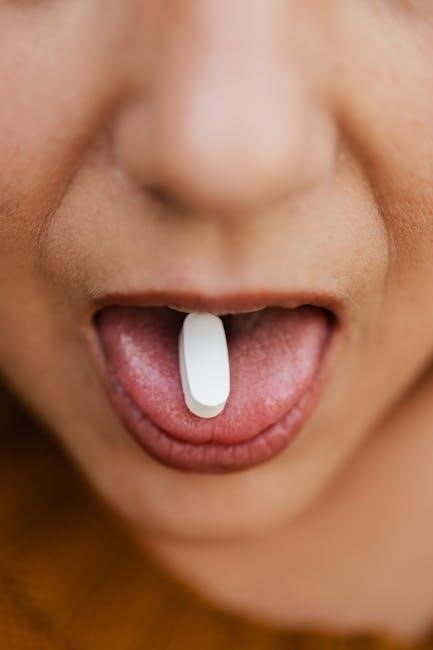Oral ivermectin is a widely used antiparasitic medication for dogs, effective against heartworms and other parasites. Understanding proper dosage is crucial for safety and efficacy.
What is Ivermectin?
Ivermectin is a potent antiparasitic medication widely used in both veterinary and human medicine. It belongs to the avermectin class of drugs, derived from bacteria in the soil. The drug works by targeting the nervous systems of parasites, ultimately leading to their paralysis and death. Ivermectin is available in various forms, including oral tablets, topical creams, and injectable solutions, each tailored for specific uses.
In veterinary care, ivermectin is primarily used to treat and prevent parasitic infections such as heartworms, mites, and intestinal worms. It is also known for its safety and efficacy when administered at correct doses. However, improper use can lead to toxicity, emphasizing the importance of precise dosage calculations, often facilitated by tools like oral ivermectin dosage calculators for dogs.
Uses of Ivermectin in Veterinary Medicine
Ivermectin is a versatile medication in veterinary medicine, primarily used to treat and prevent parasitic infections. Its most common applications include heartworm prevention, treating intestinal worms, and managing ectoparasites like mites and lice. The drug’s broad-spectrum efficacy makes it a preferred choice for many veterinarians. Additionally, ivermectin is used off-label for certain conditions, such as skin allergies and infections caused by parasites. Its effectiveness and relatively low cost contribute to its widespread use in both companion animals and livestock. Proper dosing, often determined using an oral ivermectin dosage calculator, is essential to ensure safety and therapeutic success in dogs.

Understanding the Importance of Dosage
Accurate ivermectin dosing is crucial for balancing safety and effectiveness in dogs. Incorrect dosages can lead to toxicity or reduced therapeutic efficacy, making precise calculation essential.
Why Proper Dosage Matters
Proper dosing ensures the medication’s effectiveness while minimizing risks. Ivermectin toxicity can occur if dosages are too high, leading to severe symptoms like seizures or even coma. Conversely, too low a dose may fail to eliminate parasites, reducing the drug’s efficacy. The balance is critical, as it safeguards the dog’s health and prevents resistance. Factors like weight, overall health, and parasite type influence the correct dosage, making precise calculation vital. Using tools like a dosage calculator or consulting a vet helps avoid errors, ensuring the treatment is both safe and effective for your dog.
Consequences of Incorrect Dosage
Incorrect dosing of oral ivermectin can lead to serious health risks for dogs. Overdosing may cause symptoms like vomiting, diarrhea, drooling, lethargy, and in severe cases, seizures or coma. Conversely, underdosing may fail to eliminate parasites, leading to ongoing infestations. Improper use can also result in toxicity, particularly in sensitive breeds, causing neurological issues. Additionally, inconsistent or incorrect dosing may reduce the drug’s efficacy over time, potentially contributing to parasite resistance. It is crucial to adhere to prescribed guidelines to avoid these risks and ensure safe, effective treatment. Always consult a veterinarian to confirm the correct dosage tailored to your dog’s specific needs.

Factors Affecting Ivermectin Dosage
Factors affecting ivermectin dosage include the dog’s weight, overall health, and the type of parasite being treated. These elements ensure safe and effective treatment outcomes for dogs.
Dog’s Weight and Size
A dog’s weight and size are critical factors in determining the correct oral ivermectin dosage. Dosage calculators often categorize dogs into weight ranges, such as 5-15 lbs, 15-30 lbs, and 30-60 lbs, with corresponding dosages in mg/kg or cc per pound. Even a small variation in weight can significantly impact the dosage, making precise calculation essential. For example, a 10-pound dog might require 0.1-0.2 mg/kg, while a 50-pound dog needs 0.4-0.6 mg/kg. Incorrect dosing based on weight can lead to ineffective treatment or toxicity. Breed size and metabolism also play a role, as larger breeds may require higher doses. Always use a reliable dosage calculator or consult a veterinarian for accurate measurements.
Dog’s Health Status
A dog’s health status significantly influences the appropriate dosage of oral ivermectin. Dogs with underlying medical conditions, such as liver or kidney disease, may require adjusted dosages to prevent complications. Puppies, pregnant dogs, and those with compromised immune systems also need careful consideration. Additionally, dogs diagnosed with heartworms may require different dosing strategies to avoid adverse reactions. It’s crucial to evaluate the dog’s overall health before administering ivermectin, as pre-existing conditions can affect how the medication is metabolized. Always consult a veterinarian to ensure the dosage aligns with the dog’s specific health needs and medical history. This personalized approach helps maximize safety and efficacy.
Type of Parasite Being Treated
The type of parasite being treated plays a critical role in determining the appropriate oral ivermectin dosage for dogs. For instance, heartworms require a specific preventive or therapeutic dosage, while other parasites like fleas, ticks, or intestinal worms may necessitate different dosing regimens. The severity of the infestation and the parasite’s life cycle also influence the dosage. For example, microfilariae (immature heartworms) may require a lower dose compared to adult heartworms. Additionally, the susceptibility of the parasite to ivermectin must be considered, as some species may exhibit resistance. A veterinarian’s expertise is essential to tailor the dosage accurately based on the specific parasite and its lifecycle, ensuring effective treatment while minimizing risks.
Methods for Calculating Oral Ivermectin Dosage
Methods include using a dosage calculator or manual calculation based on weight. Calculators simplify the process, while manual methods require precise measurement to avoid overdosing.
Using a Dosage Calculator
A dosage calculator simplifies determining the correct ivermectin dose for dogs. These tools consider the dog’s weight, parasite type, and treatment purpose. By inputting the dog’s weight, the calculator provides a precise dose, reducing error risk. Many online calculators are available, offering quick and accurate results. They often include options for heartworm prevention or therapeutic doses. Some calculators also account for the medication’s concentration, ensuring the right amount is administered. Using a reliable calculator is a practical way to ensure safety and efficacy, though consultation with a veterinarian is always recommended for confirmation.
Manual Calculation Based on Weight
Manual calculation of ivermectin dosage involves using the dog’s weight in kilograms or pounds. The standard dose for heartworm prevention is 6 mcg/kg, while therapeutic doses may range from 0.2 to 0.4 mg/kg. To calculate, divide the dog’s weight into the recommended dose. For example, a 30-pound dog requires 0.15mg per pound, totaling 4.5mg. Always use a precise scale and the correct formulation to avoid overdosing. Consulting a dosage chart or veterinarian ensures accuracy. This method is reliable but requires careful attention to avoid errors, making it less convenient than using a calculator.

Standard Dosage Guidelines
Standard dosage guidelines for oral ivermectin in dogs are typically 6 mcg/kg for heartworm prevention and 0.2–0.4 mg/kg for other parasites, based on weight.
Preventative Dosage for Heartworm
The preventative dosage of oral ivermectin for heartworms in dogs is typically 6 mcg/kg of body weight, administered once monthly. This dosage ensures that the medication effectively prevents the development of heartworm larvae, safeguarding your dog from this serious parasitic infection. It’s crucial to follow this specific dosage to maintain its preventative efficacy without causing potential toxicity. Veterinarians often recommend this dosage as part of a regular heartworm prevention program, tailored to your dog’s weight and health status; Always consult a veterinarian to confirm the correct dosage and schedule for your dog to ensure optimal protection and safety.
Therapeutic Dosage for Parasites
When treating active parasite infestations, the therapeutic dosage of oral ivermectin for dogs typically ranges from 0.2 mg/kg to 0.4 mg/kg of body weight. This dosage is higher than preventative doses and is administered as needed, depending on the severity of the infestation and the type of parasite. For example, treatments for mange or intestinal parasites may require repeated doses spaced 7-14 days apart. It’s essential to follow a veterinarian’s guidance to ensure the correct dosage and treatment frequency, as overuse can lead to toxicity. Always use a precise dosage calculator or consult a vet to determine the exact amount for your dog’s specific needs.
Administration of Oral Ivermectin
Administer oral ivermectin with or without food, ensuring the dog swallows the dose. Use a syringe for accuracy, especially for small dogs, and consult a vet for guidance.
How to Give Ivermectin to Dogs
Giving oral ivermectin to dogs requires precision to ensure safety and effectiveness. Administer the medication directly into the dog’s mouth, ensuring it is swallowed. For accuracy, especially in smaller dogs, use a syringe without a needle to deliver the exact dose. It’s best to give ivermectin on an empty stomach or with food, depending on veterinary advice. Always follow the prescribed dosage and consult a vet for guidance. Proper administration helps prevent underdosing or overdosing, ensuring the treatment is effective and safe for your dog. Never adjust the dose without professional consultation.
Frequency of Administration
The frequency of administering oral ivermectin to dogs varies based on the purpose, such as prevention or treatment. For heartworm prevention, ivermectin is typically given once monthly. Therapeutic doses for other parasites may require more frequent administration, often every 1-2 weeks, depending on the severity of the infestation. It’s crucial to adhere to the prescribed schedule to ensure effectiveness and prevent resistance. Over-administering can lead to toxicity, while under-administering may reduce efficacy. Always consult a veterinarian to determine the appropriate frequency for your dog’s specific needs. Consistency is key to maintaining parasite control and overall canine health.

Safety and Toxicity
Oral ivermectin is generally safe for dogs when administered correctly, but incorrect dosages can lead to toxicity, posing serious health risks. Adhering to prescribed guidelines is crucial to prevent adverse effects. Consulting a veterinarian ensures the dosage is appropriate and safe for the dog, balancing efficacy with safety to avoid potential harm;
Symptoms of Overdose
Overdosing on oral ivermectin can lead to severe health issues in dogs. Common symptoms include vomiting, diarrhea, lethargy, and lack of coordination. In more severe cases, dogs may experience tremors, seizures, or even blindness. Prolonged overdose can result in respiratory distress, coma, or death. Recognizing these signs early is critical to preventing long-term damage. If an overdose is suspected, immediate veterinary attention is essential. A vet may administer supportive care, such as activated charcoal or gastric lavage, to mitigate the effects. Always adhere to prescribed dosages to avoid such risks and ensure the safe use of ivermectin for parasite control.
Safe Usage Guidelines
Following safe usage guidelines is essential when administering oral ivermectin to dogs. Always adhere to the dosage prescribed by a veterinarian, as improper use can lead to toxicity. Ensure accurate weight measurement and use a reliable dosage calculator to avoid overmedication. Administer the medication on an empty stomach for optimal absorption. Avoid giving ivermectin to breeds sensitive to it, such as Collies and Aussies. Do not combine with other medications without veterinary approval. Regular monitoring for side effects is crucial, and seek immediate veterinary care if adverse reactions occur. Store the medication securely to prevent accidental ingestion. Strict adherence to guidelines ensures safe and effective treatment for your dog.
Special Considerations
Special considerations include breed sensitivity, health status, and interactions with other medications. Certain breeds like Collies may be more prone to ivermectin toxicity, requiring careful dosing.
Breeds Sensitive to Ivermectin
Certain dog breeds, such as Collies, Border Collies, and Australian Shepherds, are highly sensitive to ivermectin due to a genetic mutation affecting drug metabolism. This mutation, known as the MDR1 gene defect, can lead to toxic levels of ivermectin accumulating in the brain, causing severe neurological symptoms. Even at standard doses, these breeds may experience adverse effects. For this reason, alternative treatments are often recommended for sensitive breeds. Owners of these breeds should consult their veterinarian to determine safe and effective parasite control options.
Interactions with Other Medications
Ivermectin can interact with other medications, potentially leading to adverse effects. Drugs metabolized by liver enzymes, such as CYP3A4, may increase ivermectin levels, raising toxicity risks. Examples include erythromycin and ketoconazole. Conversely, drugs like phenobarbital and rifampin, which induce CYP3A4, may reduce ivermectin’s efficacy. Additionally, ivermectin can interact with sedatives and anesthetics, enhancing their effects. Always inform your veterinarian of any medications or supplements your dog is taking. Combined use without professional guidance can lead to serious health complications, such as neurological symptoms or treatment failure. Consultation with a vet is essential to ensure safe and effective treatment.
Using a PDF Dosage Calculator
A PDF dosage calculator provides a quick reference for determining the correct ivermectin dose for dogs, simplifying the process and ensuring accuracy for safe administration.
Where to Find Reliable PDF Resources
Reliable PDF resources for oral ivermectin dosage calculators can be found on veterinary websites, pharmaceutical company portals, and trusted animal health platforms. Websites like the FDA or Merck Veterinary Manual often provide downloadable guides. Additionally, platforms like Google Scholar or ResearchGate may host peer-reviewed documents. Ensure the PDF is from a credible source, such as a veterinary organization or a reputable publisher, to guarantee accuracy. Always verify the publication date and consult with a veterinarian before using any dosage calculator for your dog.
How to Interpret the Calculator
To interpret an oral ivermectin dosage calculator for dogs, enter your dog’s weight in pounds or kilograms. The calculator will provide a specific dose based on this input. Ensure the calculator specifies the dose in milligrams (mg) or micrograms (mcg) and whether it’s per dose or daily. For heartworm prevention, doses are typically lower (e.g., 6 mcg/kg), while therapeutic doses for parasites may be higher (e.g., 0.2-0.4 mg/kg). Always verify the calculator’s credibility and cross-reference the dose with veterinary guidelines. If unsure, consult a veterinarian to confirm the accuracy of the calculated dose for your dog’s specific needs;

Consulting a Veterinarian
A veterinarian ensures accurate ivermectin dosing tailored to your dog’s health, breed, and parasite type, preventing toxicity and maximizing effectiveness while addressing specific medical needs.
When to Seek Professional Advice
Consult a veterinarian before administering oral ivermectin to ensure the correct dosage and avoid health risks. Factors like a dog’s weight, breed, and medical history play a crucial role in determining the appropriate dose. Without professional guidance, there’s a risk of underdosing, which may not effectively treat parasites, or overdosing, which can lead to severe health complications. Veterinarians can also provide personalized advice based on the specific parasite being targeted and the dog’s overall health status. Additionally, they can address any concerns regarding interactions with other medications or pre-existing conditions. Always prioritize professional advice to safeguard your dog’s well-being.
Importance of Vet-Prescribed Dosage
A veterinarian-prescribed dosage ensures the safe and effective use of oral ivermectin for dogs. Vets consider the dog’s weight, health status, and parasite type to determine the accurate dose. Incorrect dosing can lead to under-treatment or toxicity, risking the dog’s health. Vet guidance minimizes these risks, ensuring the medication works as intended without harm. Always follow their recommendations for the best outcomes and to prevent complications. Vet-prescribed dosages are tailored to individual needs, making them essential for successful treatment.